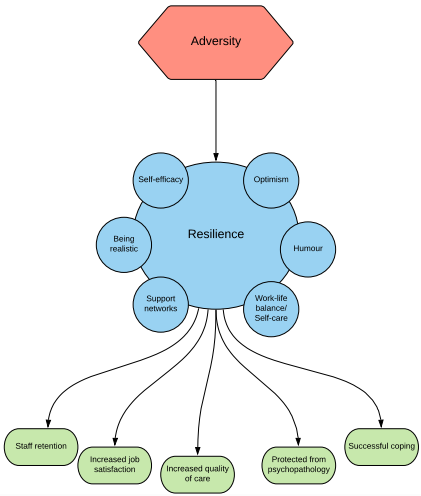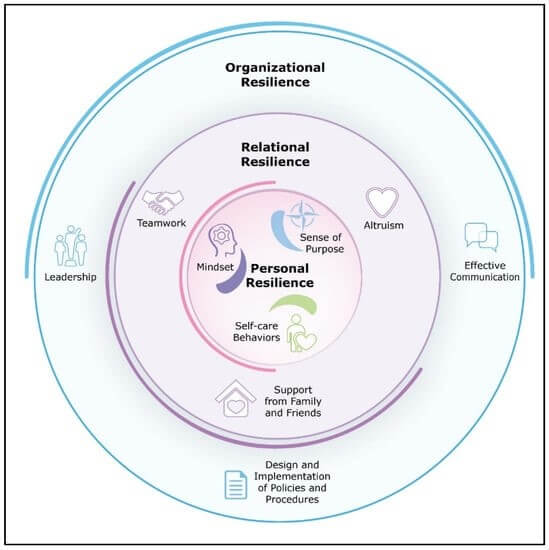Resilience in Health Care
What is Resilience?
Resilience is a complex and dynamic process. When present and sustained it allows health-care staff to positively adapt to workplace stressors, avoid psychological harm and continue to provide safe, high-quality patient care. Cooper et al. (2020) illustrates this in their concept analysis of nurse resilience.

Strategies to promote resilience in health care:
Literature reviews and studies about resilience in health care highlight the following strategies:
- Professional connectedness – Your team and leaders are in a unique position to empathize with the difficult situations you encounter. Seek support from them. Work together to build a healthy work environment.
- Meaningful work – Think about what you value and what gives you pride in your work. Look for interesting or specialized roles to take on. Reflective counselling and small group discussions can support this.
- Learning – Participate in professional development that fits with your career and life goals. This will help you build confidence, engagement, and job satisfaction.
- Autonomy – Focus on areas where you can build competencies and have greater control over your work.
- Work schedule – Consider your needs, time management and what you have control over. If you need more flexibility, talk to your manager about accommodation or work opportunities to meet your needs.
- Job demands – Adapt or schedule difficult duties (physically, mentally, emotionally) to limit their impact. Plan rest and relaxation during breaks and time off.
- Boundaries – Avoid over involvement with patients/clients/residents. Separate work from home life. Take steps to get closure following stressful workplace events.
- Emotional intelligence – Learn to manage your emotions and understand those of others. Use the elements of emotional intelligence to do this: self-awareness, self-regulation, motivation, empathy, and social skills.
- Behavioral activation – Be deliberate in self-care practices. Prioritize time to enjoy valued activities that nurture your mind, body, and spirit.
- Other life roles – Be aware of how the many roles you have, including those outside of work (spouse, parent, homemaker, caregiver, citizen, etc.), may impact your stress level. Take steps to find balance.
- Stress and coping – Pay attention to signs of stress. Use coping strategies to manage it. Take advantage of resilience focused education offered by your employer.
Hearing Directly from health-care staff
Resilience in health care goes beyond the individual. To develop complete and effective interventions, action is required at relational and organizational levels. Brown et al. (2021) gives a visual of resilience on these three levels.

Resources for staff to promote resilience and wellbeing:
- Healthcare Workers – Cognitive Behaviour Therapy with mindfulness (CBTm)
- Blue Cross Digital Wellness Platform
- Manitoba Blue Cross Employee Assistance Program (EAP)
- Shared Health Mental Health and Wellness Resources
- Alberta Health Services Ways to Wellness Toolkit
- Alberta Health Services Ways to Wellness Video
- Winnipeg Regional Health Authority Wellbeing Guide
- Learning Management System
- Understanding & Caring for your own Mental Health
- Mental Health in the Workplace
- Stress in the Workplace
References
- American Psychological Association. (2022, May). Resilience. APA. https://www.apa.org/topics/resilience#:~:text=Resilience%20is%20the%20process%20and,to%20external%20and%20internal%20demands .
- American Psychological Association (2020, February 1). Building your resilience. APA. https://www.apa.org/topics/resilience/building-your-resilience
- Badu E, O’Brien AP, Mitchell R, Rubin M, James C, McNeil K, et al. Workplace stress and resilience in the Australian nursing workforce: A comprehensive integrative review. International Journal of Mental Health Nursing 2020;29:5–34.
- Brown, L., Haines, S., Amonoo, H. L., Jones, C., Woods, J., Huffman, J. C., & Morris, M. E. (2021). Sources of Resilience in Frontline Health Professionals during COVID-19. Healthcare, 9(12), 1699.
- Cooper AL, Brown JA, Rees CS, Leslie GD. Nurse resilience: A concept analysis. International Journal of Mental Health Nursing 2020;29:553–75.
- Cooper AL, Brown JA, Leslie GD. Nurse resilience for clinical practice: An integrative review. Journal of Advanced Nursing 2021;77:2623–40.
- Heath C, Sommerfield A, von Ungern-Sternberg BS. Resilience strategies to manage psychological distress among healthcare workers during the COVID-19 pandemic: a narrative review. Anaesthesia 2020;75:1364–71.
- Kunzler AM, Chmitorz A, Röthke N, Staginnus M, Schäfer SK, Stoffers-Winterling J, et al. Interventions to foster resilience in nursing staff: A systematic review and meta-analyses of pre-pandemic evidence. International Journal of Nursing Studies 2022;134:104312.
- Labrague LJ. Psychological resilience, coping behaviours and social support among health care workers during the COVID-19 pandemic: A systematic review of quantitative studies. J Nurs Manag 2021;29:1893–905.
- Tebes JK, Awad MN, Connors EH, Fineberg SK, Gordon DM, Jordan A, et al. The Stress and Resilience Town Hall: A systems response to support the health workforce during COVID-19 and beyond. Gen Hosp Psychiatry 2022;77:80–7.
